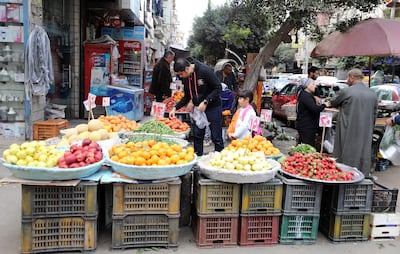Egyptian authorities have ramped up efforts to enforce price controls and combat price gouging in response to a reported lack of compliance from traders to changes in the market, the country’s Consumer Protection Agency (CPA) said on Monday.
The head of the agency, Ibrahim El Sagini was joined by the governor of Gharbia, Tarek Rahmi, on an extensive round of inspections across the governorate, located 100km north of Cairo, on Monday.
The move comes as an extension to an earlier crackdown aimed at bakeries refusing to implement government-mandated price reductions.
In addition to Gharbia’s bakeries, Monday’s inspections also targeted several other businesses, including local food vendors who sell popular items such as fool and felafel – widely consumed by Egyptians due to their relatively cheap price.

The doubling in their price from four Egyptian pounds in early 2022 to nine pounds on Tuesday, had been met with outrage from Egyptians, most of whom view them as essential dishes for a financially constrained populace.
The enforcement actions follow the Egyptian government securing over $50 billion in financing from international partners since February which have enabled it to bring down prices of essential food by 15 to 35 per cent, according to the CPA.
These agreements have bolstered the government's ability to import essential supplies, leading to a surge in the availability of goods in the market compared to last year when a large Foreign ExchangeFX backlog kept thousands of tonnes of goods held up at the nation’s ports.
In line with basic economic principles, this increased supply is expected to drive down prices for consumers, however, smaller businesses that are not registered with the government have been able to keep their prices high while also avoiding consequences from the state.
During the inspections, officials discovered numerous violations, including failure to display prices, selling above the advertised price, and non-compliance with a recent ministerial directive aimed at reducing the cost of bread, the CPA said.
Offenders were referred to the Public Prosecution.
As the government continues its efforts to enforce price controls, businesses across various sectors are facing heightened scrutiny.
The CPA has promised it will continue its co-operation with local authorities in more provinces to enhance the consumer protection system and carry out more inspection campaigns of markets.
The crackdown aims to demonstrate that the government is taking action to address the cost of living crisis.
However, the long-term effectiveness of these measures in controlling prices and alleviating the financial burden on Egyptian consumers remains to be seen, as the increased supply of goods may not necessarily translate into sustained price reductions across all sectors.
Egypt’s inflation rate remains high, 33.3 per cent in March, despite the influx of foreign financial aid.
In its latest report on Egypt’s progress in its reform programme, issued on April 26, the IMF said a larger economic recovery may take longer than anticipated and will require rigorous adherence to its outlined reforms






